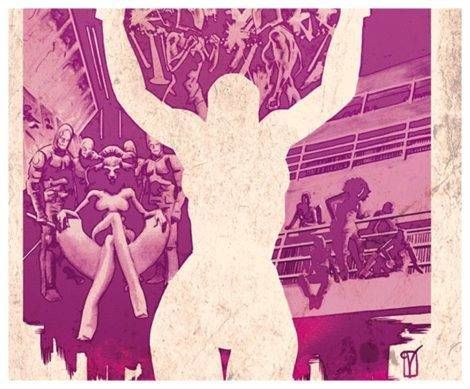
A Response to Misogyny in the Comics Industry
There are two kinds of misogyny that germinate within the comic book industry today. There is the overt misogyny that comes from creators and fans who purposefully propagate the idea that women are inferior to men and that they deserve less opportunity for representation in comics. I think of Frank Cho and his homages to Manara’s controversial Spiderwoman cover, where he mocked women’s discomfort at his art. I also think of the Internet trolls who seem to think it’s their job to put women creators down for no valid reason, but to just feel superior.
The second kind of misogyny is more casual. Passive, really. And it’s harder to pinpoint until it’s right in your face. Like when Jeremy Renner and Chris Evans joked about Black Widow being a slut without hesitation. And then when Renner did it again on Conan. Misogyny exists in comics and while you may not see it or experience it, I guarantee you there is a whole group of people, fans, creators who do on a daily basis.
I’m not going to bother asking why, either. Rather I’m going to say that it baffles me that misogyny runs rampant in the industry. It does. It frustrates me because for the last five years as a fan, commentator, and writer in comics I’ve seen it become more hideous and hurt a lot of the creators that I look up to and admire. After five years of that, asking the question why is kind of pointless. It’s pointless because, to me, it’s obvious why there’s so much sexism in comics. It’s comes from one thing.
Fear.
It’s the fear that if women are given the chance, they’ll write better stories. That they’ll draw better. That they’ll change beloved characters for the worse somehow. It is the fear that female creators will put male creators out of a job and make a mockery of the industry. This idea that women are somehow a threat to everything men have worked so hard for is ludicrous. Not because it’s true, but because it’s become the common mentality in the industry.
What’s worse is how this fear is spun. Instead of accepting the fact that a woman could write better than a man, it’s easier to say that a woman can’t. It’s easier to put women down, or in a box leaving them there so that they become nothing more than a novelty. “A woman writing a comic at Marvel? Adorable!” “An all woman creative team? That’s cute! Better keep them away from Batman! Lol.”
That’s misogyny at one its ugliest forms.
The industry is so quick to sweep blatant acts of sexism under the rug or make it a joke, mostly because the perpetrators are in the majority. If Frank Cho is rightfully criticized for invalidating a whole group’s discontent, Rob Liefield is right there to stand by his side and defend him with other like-minded creators and fans. Or if Renner and Evans apologize for calling Black Widow a slut, we’re fast to say, “They made a mistake and apologized. No harm, no foul.” Wrong. You’re missing the point.
The point is that women are not given the same amount of respect as men are, and because of that they have an infinitely harder time fighting for diversity and representation in comics. Doesn’t that seem wrong? Why is it that in an industry that is supposed to celebrate empowerment and change and growth, there is a huge group of people being told that they’re not allowed to do the same?
Am I making sense? Am I off here?
I ask, because I’m a man. A cis male when we get down to it, who can’t fathom what it is like to be a woman in comics, or even in general. I’m an outsider. I can only try to make sense of what I’ve observed and what that is, is misogyny. It is the misrepresentation of women in comics, lack of representation of women in comics, and the disregard of women as equals to men.
There has been headway. Creators like Kelly Sue DeConnick, Gail Simone, G. Willow Wilson, Kate Leth, Faith Erin Hicks, Jordie Bellaire, Ming Doyle, Emily Carroll, and Noelle Stevenson are fighting for equality in comics and winning. Kelly Sue DeConnick is a hero, with her book Bitch Planet being the next great piece of feminist literature. Gail Simone is a living testament to perseverance and forward thinking in a market that wanted nothing more to than to squash that. Thanks to them and the incredible women that came before them, there are more female creators and comic book fans than ever. Progress is slow, but it is good.
However, can the comic book industry continue to thrive at this rate, while its fan base diversifies but creators don’t? What will happen to the female creators and fans when they’re told that they are inferior and their stories, opinions and art don’t matter? Who else is going to fight against the misogyny, when women’s voices are being ignored?
I believe that I have a responsibility to, at the very least, talk about this. Misogyny, outside of comics as well, is evil and if I do nothing to change it, I’m no better than its biggest perpetrators.
There is no room for fear in comics. There is no more room for misogyny.
____________________
Follow us on Facebook for more comics fun.












